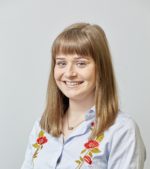A love letter to camaraderie and software help - Elizabeth Young
Written by Elizabeth Young

Having never run a marathon, I do wonder what it’s like to get to the last stretch? Would I wallow and drag myself over the finish line, or would I get a burst of energy and absolutely celebrate the journey?* If it’s analogous to the PhD process, then honestly, I’m still none the wiser.
Nearing the end of my PhD and this final chapter has been a strange one. Having gone home for 4 months during lockdown to be fed very Scottish meals, surrounded by my loved ones at my childhood home, is a blessing I never thought I’d experience long-term again in my adult life. However, there has been a pang of wistfulness for the research environment that I had so taken for granted. My research has continued as before, but the camaraderie and wildly discursive lunchtimes have been missed. On that note, I do think the past few months have brought a new air of community, transparency and sensibility to academia – I’ve been so impressed by the commitment to wellbeing and prioritisation of people. It’s taught me a lot about what culture values I value for the future.
Research-wise, learning to interface four different physics for computational simulation has been nothing short of onerous. My model simulates an external solid deformation (representative of say, a herniated disc) on the supplying, free-flowing vasculature of the spinal cord. The mechanical strains and disruption of the primary flow are coupled to the receiving intrinsic microvasculature of the cord (represented as a porous medium) and oxygen transport throughout the tissue, to understand at what strains critical thresholds are met. I’m currently working on increasing the model sensitivity to account for larger cord deformations and hope to employ more physiologically realistic material parameters next. I would like to hereby express my appreciation to the software help teams who support our academic ventures: please accept this as a shoutout.
I would say computational projects give you a lot of degrees of freedom (like my undefined boundary constraints) (an engineering joke – ha, ha, ha.), but it has been challenging to focus on one sole task, as “normal”. Variation is so important: recently I’ve been enjoying the challenge of online teaching – shoutout to the black screen warriors! – and have undertaken a role as an analyst at a student-focused VC fund, Creator Fund. These experiences have already honed my communication skills massively and I am so excited to keep nurturing the networks I’ve been so lucky to build during my time here at Leeds.
(*For all the runners reading this shaking their heads at my naivety, I do know I’d absolutely be option one, but it felt like a powerful literary introduction).
